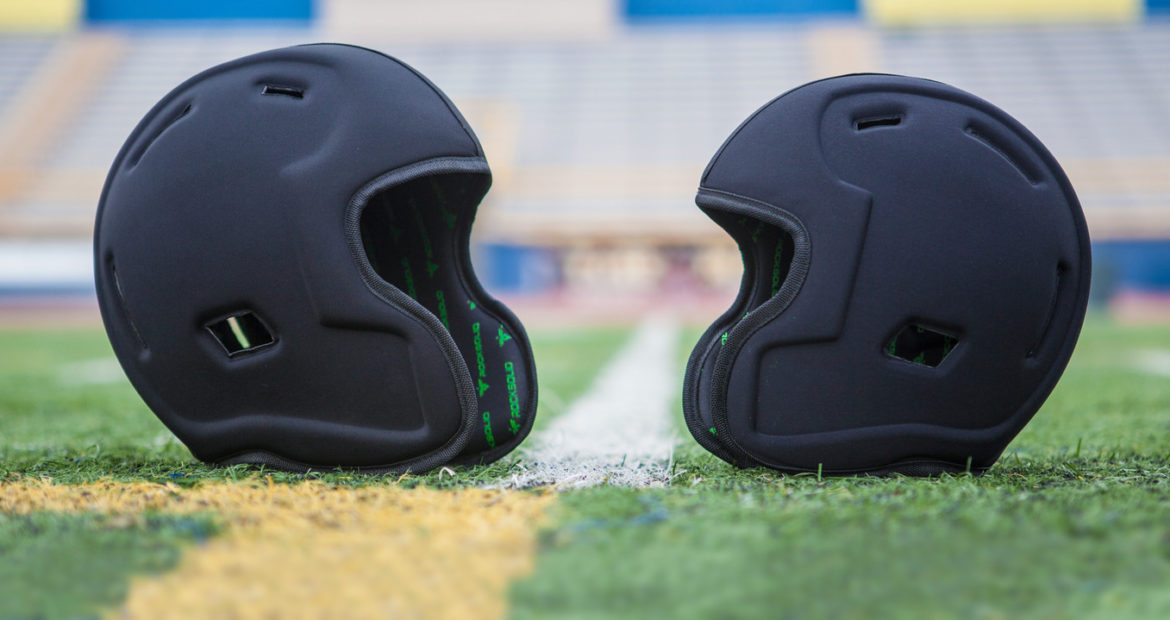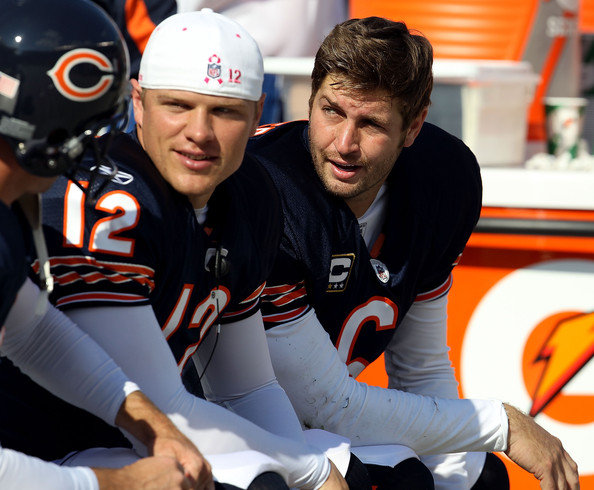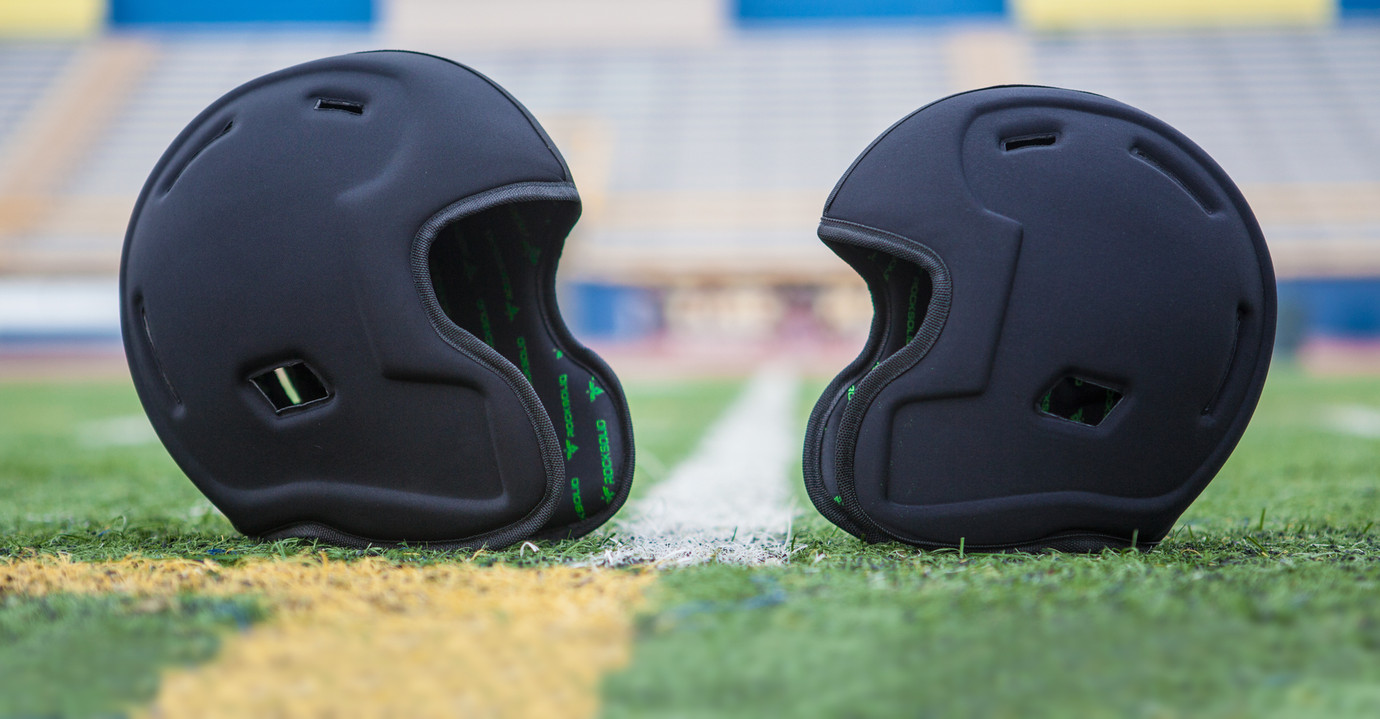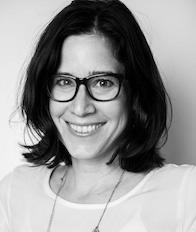
NFL Afterlife: Caleb Hanie
Welcome to the debut of NFL Afterlife, a series of conversations with former players about their careers, life without pads, and anything else we want to discuss.
First up is former quarterback Caleb Hanie, predominately known for his tenure with the Chicago Bears as Jay Cutler’s backup. As a player, Hanie is most remembered for entering the 2010 NFC Championship against the Packers after Cutler sprained his MCL and backup Todd Collins suffered a shoulder injury. Hanie’s performance that day was mixed – he led the Bears down the field for a dramatic touchdown but also threw two picks en route to a loss.
Hanie started four games the following year for an injured Cutler before being released at the season’s end. He subsequently spent various blips of time with the Broncos, Browns, Ravens and Cowboys before effectively retiring in 2014.
Now 29, Hanie has shifted his professional focus to a product that he believes can help preserve a sport that is “under attack.”
Melissa Jacobs: The Internet lists you as a free agent. But you told me earlier that you’re done. Is that the case no matter who calls?
Caleb Hanie: Yeah. I told my family that unless someone gives me a guaranteed contract, I’m done. I assume no one’s going to come out and do that.
MJ: Are you positive? It’s not like quarterbacks grow on trees.
CH: Yeah right. Let me give you a snapshot of my last two seasons. I was in Baltimore two years ago. For eight months I dedicated everything to the team. I move there, rent a place, and have my family come back and forth to visit. So I end up spending a lot of money on travel and living expenses and there’s so much time away from my family chasing this dream.
What happened there is we get to August, and then I was released. It seemed like the plan all along. I felt a little bit used because I brought a lot of experience to the quarterback room but I was really just an extra arm for camp. Baltimore does things the right way. That’s just commonplace in the league.
MJ: So you’re constantly having to find short-term housing, which I assume is hard in some cities, not to mention expensive?
CH: Yes, and often you have to eat your deposit. It’s all part of the deal. It would be fine if these teams would give you $40,000-50,000 as a guarantee. If you make the team it’s all worth it, of course, because you get paid more than you should. But for guys that are vested like me, I don’t expect a signing bonus but something to make it worth the time. It was fine for a while because my kids were young and we could be more flexible. But I just don’t want to do that anymore. Every year I don’t make a team I’m not making money so the bank account goes one way.
MJ: How old are your kids now?
CH: My kids are 5 and 3. My daughter just turned five and she’ll be going to school this year.
MJ: Is there a special mentality it takes to be a successful backup? Like do you just have to come to grips with it, because it seems like waiting for a teammate to get injured would be a pretty miserable way to exist?
CH: It’s one of the tougher jobs in all of sports. You have to be self-motivated. You’re not getting the rewards of playing in the game and the stuff that coming along with that, but you’re doing the same amount of work, if not more, than the guy who’s starting the games. You have to be selfless and have a huge amount of patience.
MJ: Didn’t you just want to set out a trap for your starting quarterbacks?
CH: (Laughing) No, most of the time I became good friends with the starters. I always wished the best for them; at the same time I didn’t want to just be there and be their personal assistant by any means.

MJ: Speaking of your starters, tell me a good Jay Cutler story.
CH: Oh gosh. I wish I had a good one that would give Jay justice. It’s hard to get in on Jay’s good side and I kind of want to stay there.
MJ: Ok. How about something benign then like his go-to karaoke song?
CH: Well, I would say he’s somewhat of a fashionista. His closet is like an entire bedroom full of clothing, like a hundred suits. When you’re a first-round pick, you get that bug early for suits and all that kind of stuff.
MJ: And he certainly married into that world as well.
CH: Oh yeah, she’s perfect for him.
MJ: What’s your proudest accomplishment in the NFL?
CH: I would say just staying around long enough to be a vested player. It’s really hard – the average guy only plays for something like 2.9 years. The fact that I accrued those five seasons and played for seven total is my proudest accomplishment. I wish I had more opportunities and made more of the ones I did have but I’m still proud.
MJ: Can you explain what it means to be vested?
CH: Once you get 3 years and three games, and to qualify as an accrued season you have to be on the roster for three games. You get five years of free health benefits after you’re done playing. And you get the pension – that is the big one. For me, it’s $500 for every year I played and you get that amount per month once you turn 55. Vested players also get an annuity after 10 years. And there are other cool benefits while playing, like if a team cuts you after Week 1 you get to collect your salary for the whole season.
MJ: Obviously concussion issues have come to light in recent years. How many did you have as a pro?
CH: I didn’t have any concussions over my career, which is crazy. It also doesn’t help for my current business (laughing.)
MJ: Yes, let’s talk about the soft-shell head protection of RockSolid. What’s your exact role with the company?
CH: I’m a vice-president and I also am in charge of developing the Texas market. My buddy Joey LaRocque – we were roommates together with the Bears – designed the product and I joined in after I was done playing. I’m so passionate about what we’re doing.
MJ: Can you explain how your soft-shell helmets help the game?
CH: We want to change the culture so players wear a soft-shell helmet and stay protected but stop wearing a traditional helmet that might cause you to be overly aggressive in a non-contact situation. What happens, and we see it across high school, college and the NFL, is maybe a walk-through or something the day before a game, the coach will say to take off the pads but keep a helmet on to protect your head. The problem is that when someone hits me with a helmet and I have no protection, that’s a helmet to a collarbone, and a possible broken collarbone. I hit my finger on a helmet numerous times the day before a game.
[Cowboys linebacker] Sean Lee in OTAs tore his knee because they were going full speed. That stuff can be avoided. They’re not even supposed to hitting that time of year but when guys have a facemask in front of them and a heavy helmet on their head, it’s just a mental thing.

MJ: Are you marketing your product to youth leagues in particular, the NFL or both?
CH: It’s marketed for everyone. In our vision, you need to have something to protect your head at all times, whether you have pads on or not.
We hope to be in the NFL sooner than later. The players we’ve talked to love it. All my buddies can’t believe they didn’t think of it. That’s basically what we hear across the board from players and coaches. They think it’s the future.
MJ: You recently tweeted that the game of football was under attack. What did you mean by that? Was it at all related to Chris Borland’s retirement?
CH: That was meant to be taken literally. Long before Chris Borland, I vividly remember LeBron James tweeting last year that he wasn’t going to let his kids play tackle football.
What we’re seeing as a company in non-contact football is our numbers are growing but the overall football numbers are going down from a young age. I feel like there’s a scared mom syndrome out there. Moms just aren’t educated about concussions and how to prevent them, so they deprive their kids of all the good things that football brings. Work ethic. Discipline. Sacrifice. Camaraderie.
Everything that’s good about football is being lost because their mom is scared of a concussion. We have people leaving the sport when we should be looking at ways to make the game safer. Our head guard isn’t the end all solution but our enhanced technology goes hand-in-hand with better coaches and more education.
MJ: What’s your favorite aspect of being involved in RockSolid?
CH: While this is a good business for us we get to make a difference for the game that gave us so much. I definitely feel like we’re giving back to game and benefiting from it too. Five years from now when everyone’s wearing soft-shell for flag football we can look back with pride and say, ‘We helped do that.’



